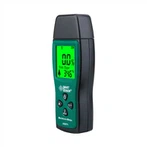Introduction to What a Multimeter Is Used to Measure
A multimeter, also known as a multimeter or reusable meter, is the most basic and essential measuring tool for electronic engineers. Its basic functions include measuring AC/DC voltage, AC/DC current, resistance value, detecting diode polarity, testing circuit continuity, etc. Some high-end ones also include capacitance measurement, transistor testing, pulse frequency measurement, etc. Multimeters can be roughly divided into two categories: pointer multimeters and digital multimeters.
A multimeter has the advantages of versatility, wide range, and easy use, making it the most commonly used tool in electronic measurement. It can be used to measure resistance, AC/DC voltage, and DC voltage. Some multimeters can also measure the main parameters of transistors and the capacitance of capacitors. Mastering the usage of a multimeter is a fundamental skill in electronic technology.
Common multimeters include pointer multimeters and digital multimeters. A pointer type multimeter is a multifunctional measuring instrument with the meter head as the core component, and the measured values are read by the pointer on the meter head. The measured values of a digital multimeter are directly displayed in digital form on the LCD screen, making it easy to read. Some even have voice prompts. A multimeter has a common header for collecting electricity
An instrument that integrates a pressure gauge, an ammeter, and an ohmmeter. The DC current range of a multimeter is a multi range DC voltmeter. The parallel connection of a closed circuit voltage divider resistor in the meter head can expand its voltage range.
The DC voltage range of a multimeter is a multi range DC voltmeter. Connecting a voltage divider resistor in series with the meter head can expand its voltage range. The corresponding range varies depending on the voltage divider resistor.
The head of a multimeter is a magneto electric measuring mechanism, which can only measure AC power by converting AC to DC using diodes.
On the basis of the current connection method, adding a battery, dividing resistor, and band switch forms an ohmmeter.






